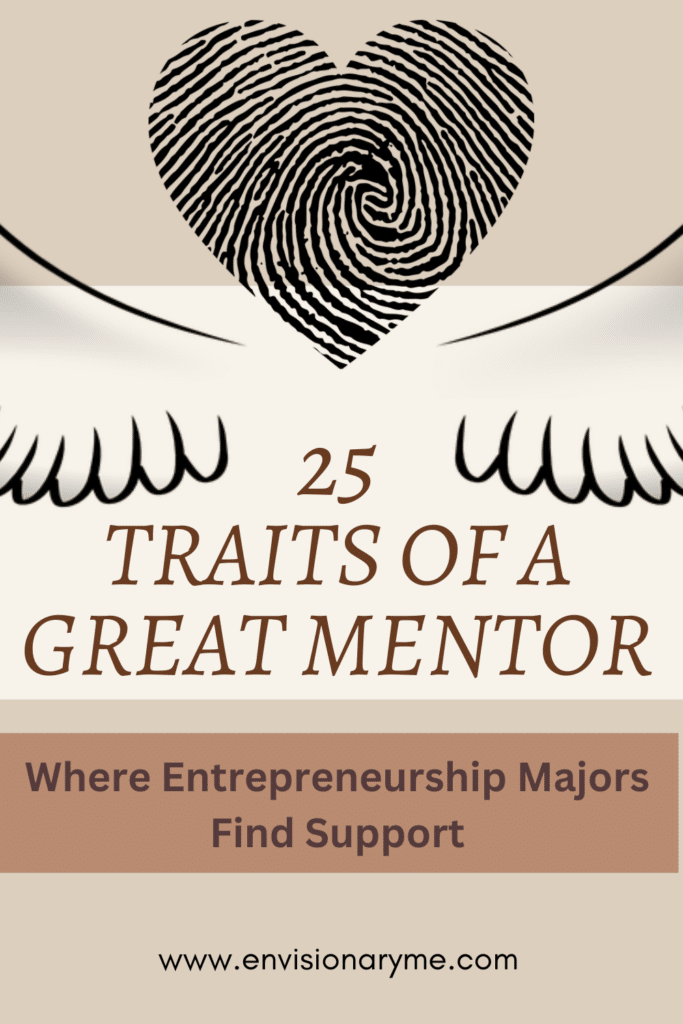Great mentors share similar traits, not similar titles. Entrepreneurship majors want a mentor who is a role model and who also recognizes their talent and natural abilities. Though the right mentor may have an individual specialty, the personal traits that make a good mentor are the same. The best mentors can help young entrepreneurs achieve mentorship goals while also providing guidance, offering honest feedback, and setting them up to find success after graduation.

Great mentors share similar traits. Entrepreneurship majors especially appreciate great mentors who understand how difficult it is to be handed a diploma and walk right into…. well… nothing.
Where corporate programs and the web and hierarchy of available support within that business environment provide direction and comfort, developing your own environment and web of support is also energizing; it simply provides a different type of comfort. Very often it’s that comfort, which allows you to then be comfortable stepping right out of that comfort zone!
“A mentor is someone who sees more talent and ability within you, than you see in yourself, and helps bring it out in you.” ~Bob Proctor
How to recognize that right mentor.
The traits of a great mentor have much less to do with title and more to do with their skill set and a high EQ. A mentor who is positive, consistent, and willing to help has great potential.
Your most effective mentor may not have the industry skillset, particular technical expertise, or even the connections, but may excel at goal setting, organization, and building new relationships. That is incredibly helpful. What a great opportunity to brainstorm and be creative. They can open your eyes to activities you may not have considered.
No matter where you are along your path, Be Open.
“A mentor is not someone who walks ahead of us to show you how they did it. A mentor walks alongside us to show us what we can do.” ~Simon Sinek

Character matters.
~ Job titles do not matter.
~ What someone looks like or wears does not matter.
– Someone who is skilled but doesn’t show up on time, if at all, is not helpful.
– A decisive executive who cannot prioritize you onto a calendar for two months is not helpful.
Don’t get hung up on a title or company name, and don’t sell yourself short.
Find a mentor who brings these factors to your mentor-mentee relationship.
Let’s talk through helpful definitions of words used to describe mentors.
Ø Ability is the possession of the means or the talent, skill, or proficiency to do something.
Ø Capability is a combination of your skills, knowledge, behaviors, and competency; it’s a talent or ability with the potential to develop further and may also be proprietary to your company or situation.
Ø Characteristic is a distinguishing feature or quality belonging to a person.
Ø Competency is a level of performance determined through evaluation and measurement.
Ø Habit is a tendency or regular practice that is difficult to stop or give up.
Ø Skill is an ability coming from knowledge, practice, or aptitude. It includes tasks you do well and may have acquired through training or experience.
Ø Traits are distinguishing qualities of a personal nature you are born with that are related to your character.

“The delicate balance of mentoring someone is not creating them in your own image but giving them the opportunity to create themselves.” ~Steven Spielberg
Why traits matter when crafting a strong mentorship.
Skills and habits don’t necessarily make for a great mentor, though particular skills and helpful habits can be desired and lead a person to success.
Personality traits are different. Our personalities are made up of a unique set of traits that make us who we are; so likewise, personality traits can be described as reliable predictors of our behavior. The pattern is consistent and individual to each of us.
When considering traits, you’ll find over 4000 of them! These 25 traits are commonly thought of as positive, helpful, and constructive when it comes to keeping the mentee’s best interests in mind.
Recognizing these 25 traits will help you partner with a great mentor.
These are the most referred-to traits young entrepreneurs seek in a mentor, but they are purposely not in any order.
- Compassionate
- Accountable
- Organized
- Punctual
- Collaborative
- Courageous
- Straightforward
- Empathetic
- Observant
- Confident
- Generous
- Hardworking
- Genuine
- Sincere
- Ambitious
- Unselfish
- Ethical
- Conscientious
- Agreeable
- Humble
The final five are especially helpful to young entrepreneurs and entrepreneurship majors.
- Resourceful
- Flexible
- Creative
- Creative thinker
- Brave
Ø Punctual? Yep. Try scrambling with your own busy schedule, then driving an hour to meet with someone who got caught up and is running late – but didn’t bother to tell you.
Ø Unselfish? Yep. Great word!
The point is: great skill or a great title paired with hostility, deep seeded anger, selfishness, or someone brilliant but way more unorganized than you would think… are obviously Not what you’re striving for.
A person who is highly capable in their own way, with a high EQ and desire to use strong communication skills, can put you on a clear path to success.
Mentoring relationships that truly work involve mentees who are willing to share and actively listen, paired with mentors who possess these traits and are willing to provide honest feedback. There’s no better time for entrepreneurship majors to work on their professional goals.
Open your mind to true value.
Open your mind to various industries to personal and organizational skills that pair well with your needs, including those with graceful mannerisms, storytelling talents, or hobbies that could easily pass for their own small businesses.
You want your mentor to test you. To push. To pull. To understand and misunderstand, so you get a pat on the back, while also having to explain your thought process and build.
You want to stretch. To grow.
“Spoon feeding, in the long run, teaches us nothing but the shape of the spoon.” ~E M Forster
Consider how this person might make a perfect partner.
- A mentor without the industry skill set but who can help you set and work toward SMART mentorship goals using your mutual networks may be ideal. Depending upon your needs, building your own personal board of advisors could be perfect.

Now consider how this person might make a perfect partner.
- A quirky but brilliant businessperson with kindred entrepreneurial spirits who cannot commit to a formal mentorship might be great as part of your advisor group – a flash mentor.
Regardless of their title and particular industry, their traits will highlight and help you grow. Seemingly imperfect mentors can become an enthusiastic mentor who can share their knowledge about helping others and offer insights gained through their life and career.
Even if they are part of a different industry or have never owned a business, they’re experienced and can rely on their own knowledge and skills to brainstorm, craft SMART goals, and select helpful activities. They don’t need to be in any exact industry or job to excel at providing constructive feedback and helping you develop important qualities to broaden your personal knowledge and experience.
A successful mentorship will help you grow, develop a willingness to explore, and receive constructive criticism. Even if they do not have a direct network, they understand the value of hardship and of being less experienced.
Your mentor can show you how to expand your professional relationships into your desired areas. Your professional environment will continually evolve. The best thing you can learn is how to create the best version of yourself.
In addition to meaningful traits, you’ll also start recognizing yourself as having developing habits successful entrepreneurs, leaders, and people share.
- A strong sense of self-awareness
- Getting out of your comfort zone
- Setting goals
- Taking responsibility
- Embracing change
- Having a growth mindset
So get started!
Ø Introduce yourself in person or virtually
Ø Agree on how to communicate
Ø Share mutual goals
Then…
Ø Create your plan
Ø Set SMART goals
Ø And follow through!
Remember, the best mentors are great listeners and offer relevant, thoughtful advice as they continue developing themselves. Their intentional guidance will come from that place.
Mentors don’t just use words; they walk the walk.
“The key to being a good mentor is to help people become more of who they already are – not to make them more like you.” ~Suze Orman
Learning from others and welcoming guidance from often unexpected places and people is important to your personal development.
Be open to new insights, different perspectives, and offers of support.
Whether it’s a person of knowledge in your field, an incredibly organized empty nester, someone on a park bench sharing an amazing story, or when a lighthearted introduction at a BBQ leads to an insightful “how to,” mentors come in all shapes, sizes, ages and walks of life.
Go create that new partnership and set yourself up for success. You got this!

0 Comments